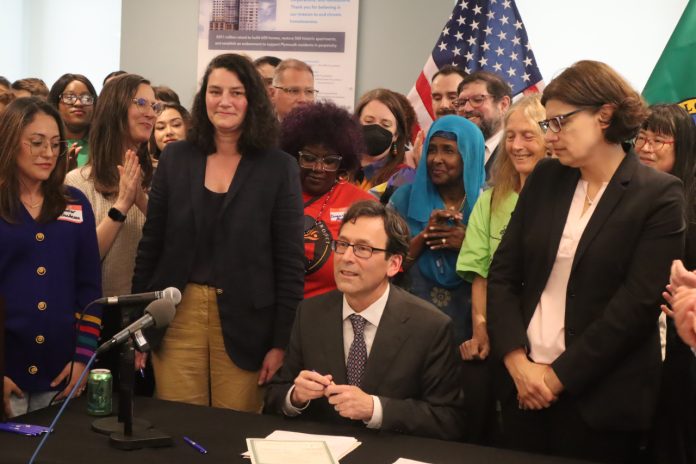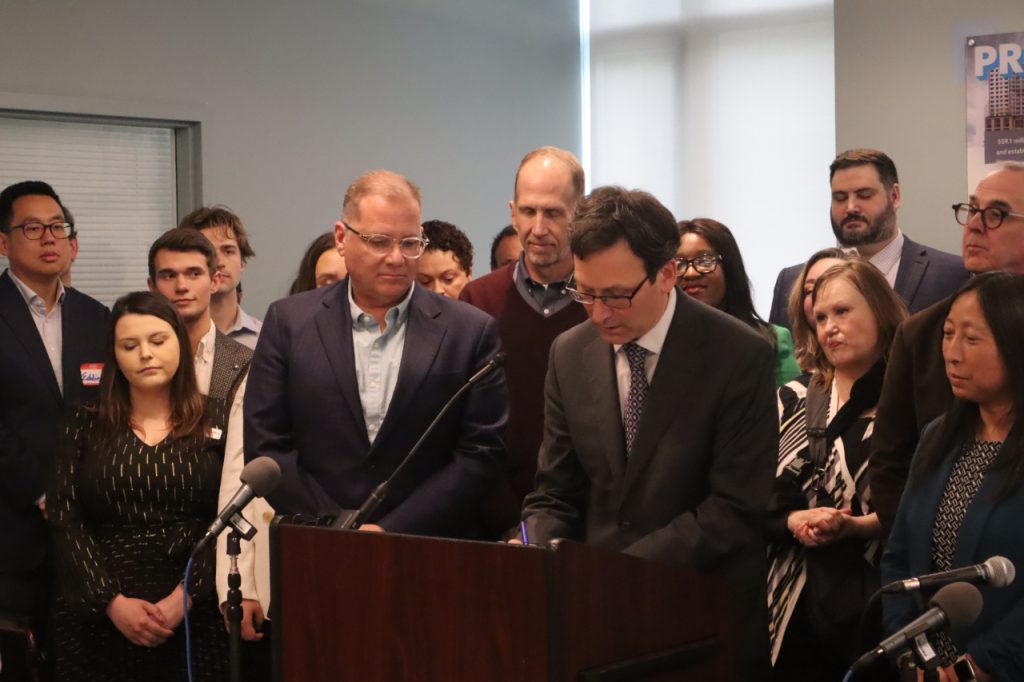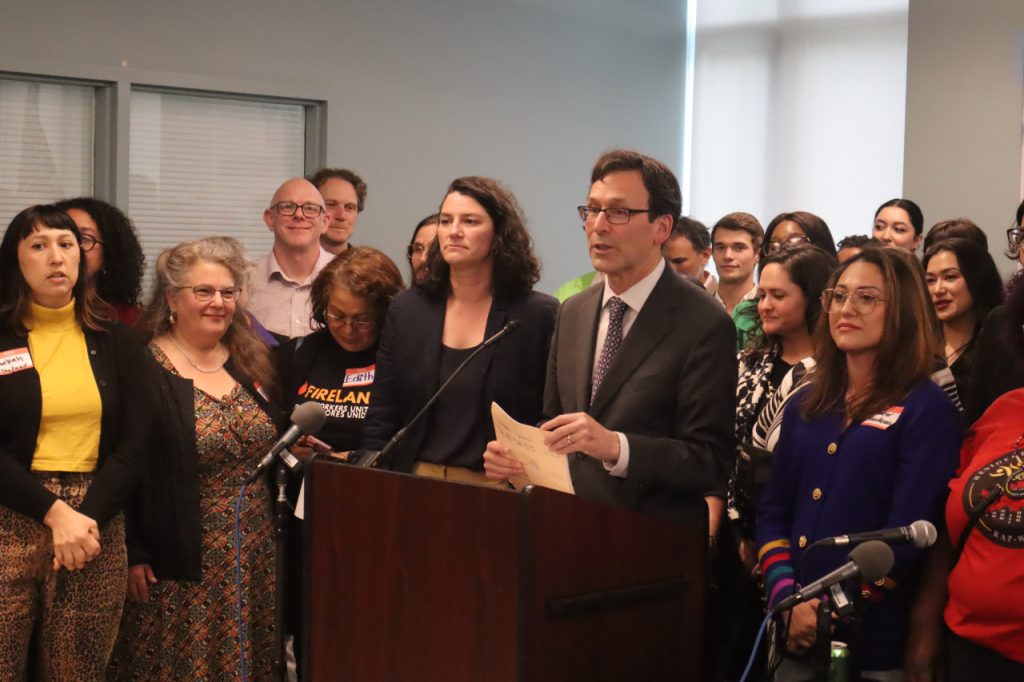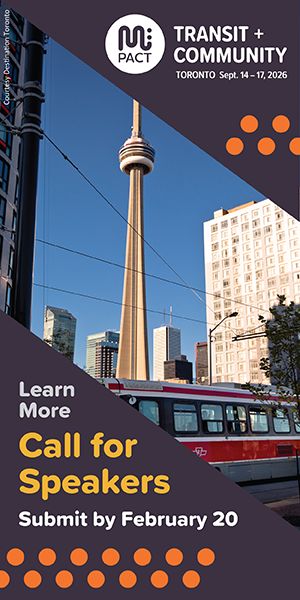
Governor Bob Ferguson came to Seattle Wednesday to sign a slate of housing-related legislation, putting the capstone on a number of long-awaited policies intended to increase housing supply and affordability in Washington. Among the bills signed were House Bill 1217, which imposes a cap on annual rent increases for tenants in buildings more than 12 years old, and Senate Bill 5184, which imposes a cap on the number of off-street parking spaces that local governments can mandate along with new construction.
These two bills represent two major pillars of what is being touted as a second “Year of Housing,” following a spree of housing-related reforms in 2023, interrupted by a relative lull in 2024’s shorter legislative session.
“I’m confident when folks look back at this legislative session, they’ll call it the session of affordable housing,” Ferguson said before breaking out the pens. “I think what you’ll see today from the bills is strong bipartisan support from the legislature to get these bills to my desk, which reflects the fact that this is a statewide problem of great concern.”
Several major housing bills remain unsigned, including House Bill 1491, Washington’s sweeping transit-oriented development bill, Senate Bill 5148, which adds a brand new layer of accountability for local governments around housing permitting and zoning, and House Bill 1576, which reforms local regulations around historic preservation. Governor Ferguson has until May 20 to take action on those remaining bills.
Parking reform
Senate Bill 5184, sponsored by Senator Jessica Bateman (D-22nd, Olympia), represents one of the most comprehensive parking reform bills enacted in any US state. In any city with more than 30,000 residents, builders will be prevented from being required to add more than one off-street parking space for every two units in an apartment building, nor more than two spaces for every 1,000 square feet of commercial space.
On top of that, cities can’t require any off-street parking spaces when issuing permits for a number of specific uses, including with affordable housing, senior housing, child care facilities, smaller apartment units (below 1,200 square feet) and commercial spaces (below 3,000 square feet) and commercial spaces in mixed-use buildings.
The goal is to allow builders the full flexibility to match parking with actual expected demand, and nothing in the bill prevents property owners from building more parking than what is spelled out in those new caps and exemptions. New surface parking lots take away scarce space that can go to other uses, and parking structures can add tens of thousands of dollars for every space added — costs that have to be passed on to future tenants and business owners.

The success of SB 5184 this session caught many housing advocates by surprise. Parking issues had previously been a third rail that many legislators were wary of addressing, given the degree to which local governments have pushed back on anything that would limit their ability to manage parking. But in the end, the potential benefits outweighed the costs for many legislators.
“There’s a growing sense of support for more proactive ways to address our housing crisis. And so you’re seeing legislators on both sides be more accepting things that have been typically taboo, like modernization of our parking minimums,” Bateman told The Urbanist. “That’s something that a couple years ago would be a complete non-starter.”
Implementation of SB 5184 will happen in phases. Cities with over 50,000 residents will have a year-and-a-half to update their land use codes to comply with the bill, allowing builders to take advantage of lower minimum parking requirements by early 2027. Cities with between 30,000 and 50,000 residents will have three full years to comply.
Counties with more than 30,000 residents are also covered by the bill. This will have a relatively big impact on places like White Center, and in unincorporated Snohomish County along frequent transit routes like the Swift Blue line and the future Everett Link light rail line.
Another less-noticed bill that Governor Ferguson already signed, House Bill 1183 sponsored by Rep. Davina Duerr (D-1st, Bothell), also includes provisions around parking that impact all cities, regardless of size. When fully implemented by the end of the decade, all affordable housing projects, along with buildings constructed to passive house standards or via mass timber and modular construction will be exempt from parking requirements.
Rent stabilization
The signing of House Bill 1217, sponsored by Senator Emily Alvarado (D-34th, West Seattle), represented the culmination of years of work to end the state’s ban on rent caps, in place since 1981. After several years of failed attempts to impose a ceiling on annual rent increases, most recently in 2024 where the measure was blocked in the Senate’s Ways and Means Committee. After a series of setbacks that looked to doom the measure for yet another year, HB 1217 was approved on the final day of the legislative session, with only seven Democrats voting against it across the two legislative chambers.
The approved cap on rent hikes will vary from year to year, with the state adding an annual inflation adjustment based on the Consumer Price Index (CPI) onto a base 7% limit. But no matter how high inflation rises, that cap can be no higher than 10%. That final compromise represents an increase from the initial flat 7% increase approved by the House in February, but a major barrier against exorbitant rent increases that can force tenants from their homes. And it matches similar rent stabilization policies already in place in both California and Oregon.

“This law is a good beginning. It’s long overdue, and it’s urgently needed,” Alvarado said Wednesday. “Forty percent of the people in the state of Washington are renters or manufactured homeowners, and before today, they had no protections over how high the rent can go, leading to pain and to devastating destabilization of families and communities.”
In the end, the parking reform bill and the rent stabilization represent two major areas for housing reform where Washington made major advances in 2025. But despite the significant number of measures adopted, there’s much left for legislators to do to ensure that every Washingtonian has a safe home.
“We need so many more homes in this state, a million more homes,” Alvarado said. “And we have to reform zoning and permitting and land use to make it easier to build homes of all types in all communities. We need significant public investment so we can increase the supply of truly affordable homes for folks with disabilities and for seniors on a fixed income, for working families who are locked out of home ownership. We also need tenant protections, and we need protections for homeowners to keep people out of foreclosure. We can do all things, we can do them together.”
Ryan Packer has been writing for The Urbanist since 2015, and currently reports full-time as Contributing Editor. Their beats are transportation, land use, public space, traffic safety, and obscure community meetings. Packer has also reported for other regional outlets including BikePortland, Seattle Met, and PubliCola. They live in the Capitol Hill neighborhood of Seattle.


